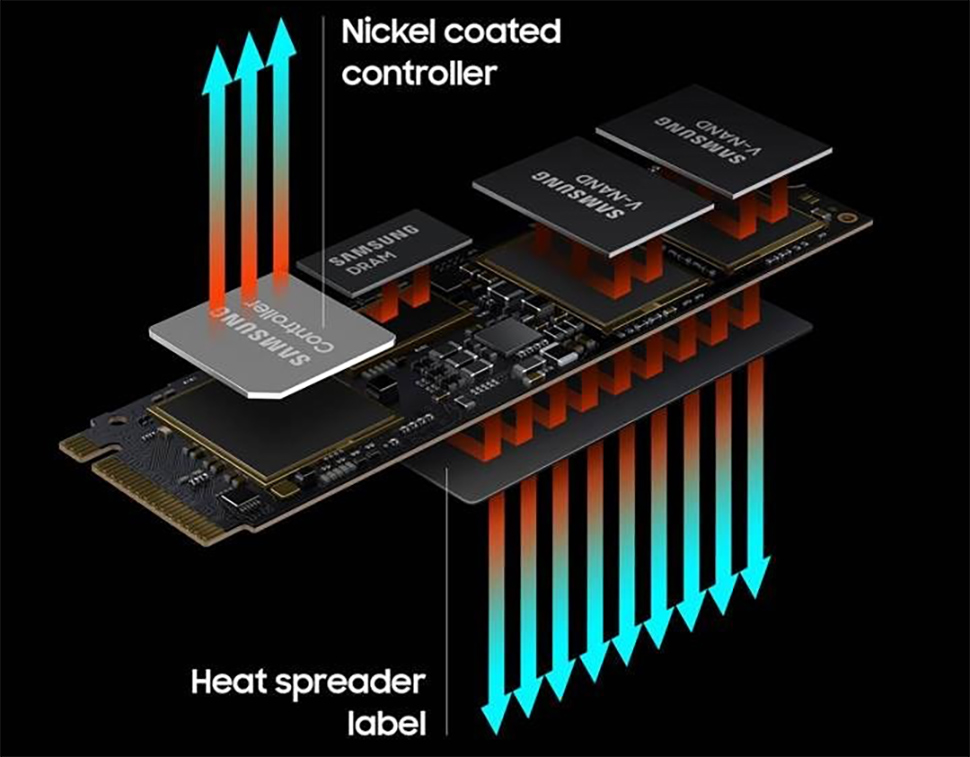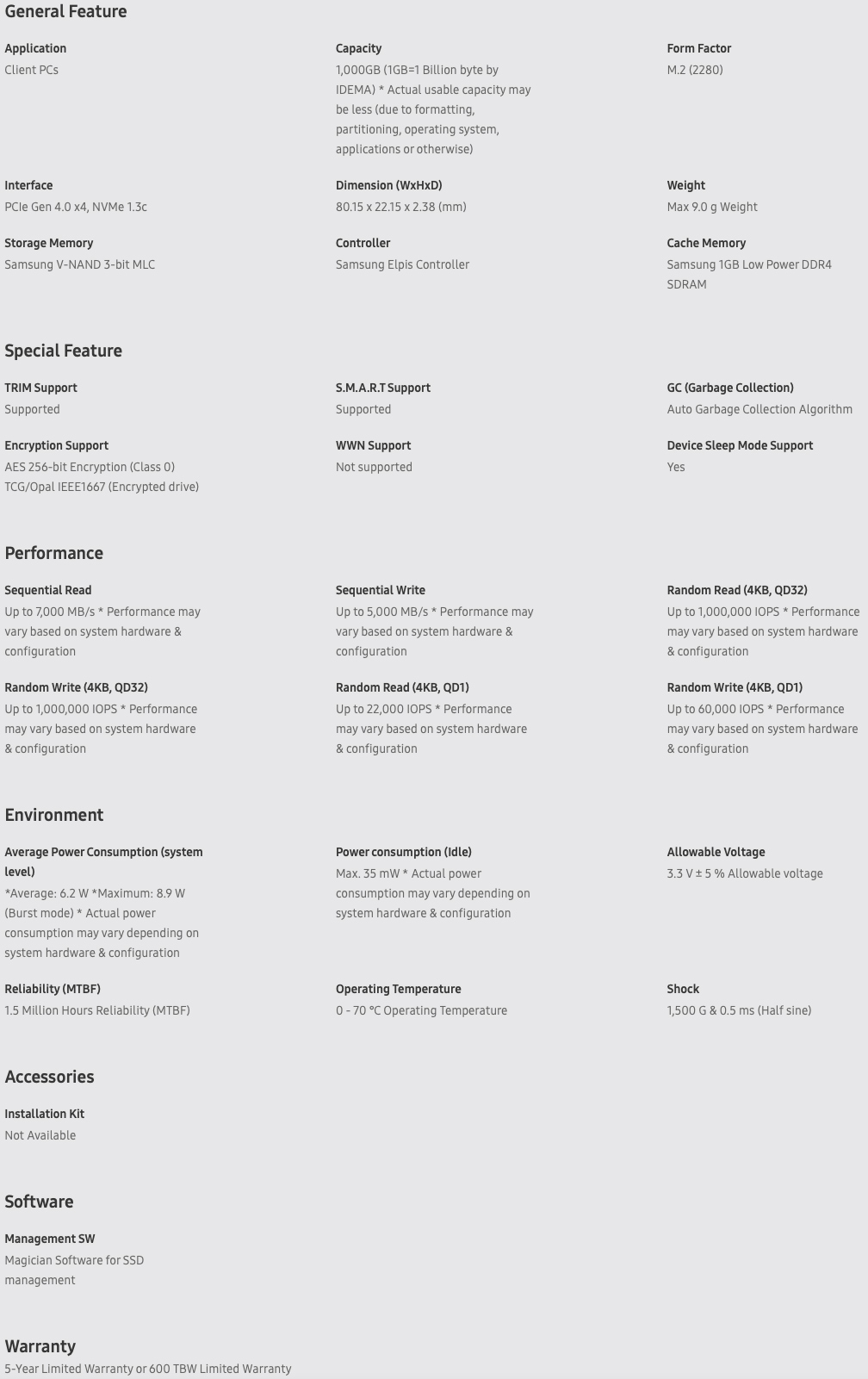Samsung Unveils 980 Pro PCIe 4.0 SSDs: Up to 7000 MB/s for a Client PC
Client class-leading sequential performance in an M.2-2280 package
When it comes to performance with client SSDs, Samsung has been leading the market for years, but the company is somewhat behind its rivals with PCIe 4.0 drives. At the CES 2020 trade show, Samsung showcased its first PCIe Gen 4 drive — the 980 Pro — but it has yet to start commercial shipments. Last week the company published specifications of the drive at one of its websites (which have now been removed), an indication that the product is about to be launched.
Samsung's 980 Pro drives feature quite impressive performance. The company promises up to 7,000 MB/s sequential read speeds as well as up to 5,000 MB/s sequential write speeds. As far as random performance, we are dealing with SSDs capable of up to 1,000,000 random reads (4 KB, QD32) as well as up to 600,000 IOPS random writes (4 KB, QD1) for the 250 GB model, the 500 GB, 1 TB and 2 TB models are up to 1,000,000 IOP. To put the number into context: competing SSDs featuring a PCIe 4.0 x4 interface often have read speeds of up to 5,000 MB/s.
The Samsung 980 Pro SSD is based on the company's proprietary controller and uses the company's 3D TLC V-NAND memory (which Samsung calls 3-bit MLC V-NAND). The drive comes in an M.2-2280 form-factor and features a PCIe 4.0 x4 interface. Current capacities consist of 250 GB, 500 GB, 1 TB and 2 TB versions.
The controller supports AES 256-bit encryption as well as TCG/Opal IEEE 1667 coding, so the drive can be adopted for PCs used by enterprises and government agencies that require advanced security. Power consumption for the Samsung 980 Pro is is rated at up to 8.9 Watts peak, but on average the drive's power consumption is about 6.2 Watts.
One of the things that has an important impact on performance of modern SSDs is proper thermal management of the controller. To that end, high-end drives for gaming PCs come with heat spreaders that may prevent their installation into laptops. Samsung's 980 PRO drives feature a nickel-coated controller to manage its heat levels and ensure consistent performance. Furthermore, the SSD also comes with a heat spreading label based on graphene.
Samsung's publication on its Singapore website does not reveal pricing or ETA dates of the 980 Pro SSDs. Companies in general hardly ever publish information about their products well before their actual release dates. To that end, it makes a perfect sense to expect Samsung's 980 Pro drives to be released shortly.
As usual for Samsung's Pro drives, the 980 Pro models are covered by a five-year limited warranty. The company declares an endurance rating of up to 600 TBW (terabytes written) for its 980 Pro 1TB drive, and 300 TBW for the 500GB model, which is half the endurance of the previous generation 970 Pro SSDs.
Get Tom's Hardware's best news and in-depth reviews, straight to your inbox.
Source: Samsung

Anton Shilov is a contributing writer at Tom’s Hardware. Over the past couple of decades, he has covered everything from CPUs and GPUs to supercomputers and from modern process technologies and latest fab tools to high-tech industry trends.
-
drtweak About time! One of the first PCIe 4.0 Drives that i was was Inland of all brands! I even bought one for a buddy (1TB Version and every Benchmark i there at it it came within 100MB or less of its solicited speeds! (5000 Read 4300 Write) and damn. Normally a SATA vs NVMe SSD (Gen 3) i hardly see a difference. But that PCIe 4.0 NVMe with a Ryzen 7 3700X was INSANE. Like i felt it would open a window before i clicked on it, it was that responsive. I hope Samsung can deliver that same fellingReply -
jgould78 Not sure if this will be final pricing but it appears that a Dutch vendor posted prices earlier than they should have: https://tweakers.net/nieuws/171562/samsung-onthult-980-pro-ssd-met-pci-e-40-interface-en-tlc-nand-officieel.htmlReply
250GB = €99
500GB = €169
1TB = €249 -
setx It's funny to see this article right after Sabrent Crushes Samsung At Their Own Game: Builds World's Fastest M.2 SSDReply
I'm really disappointed with them pushing TLC into Pro lineup. -
Makaveli They went TLC and half of the endurance at 600 TBW from the 1200 TBW for the 970 pro drive.Reply
If I look to put in a second m2 drive in my system it will be something based on the Phison E18 controller. -
Makaveli Replymdd1963 said:What do we want to bet this only shaves at best another 1/4 second from boot times?
Possible maybe the bottleneck in bootup is more windows than the NAND.
How much of a difference does an Optane drive make on bootup which is suppose to be much faster? -
jeremyj_83 Reply
Remember what matters for desktops is QD1 IOPS performance. One reason why Optane SSDs feel that much faster than NVMe SSDs despite being on PCIe 3.0 is due to the extremely high QD1 performance. If Samsung can hit the 60k write IOPS at QD1, then that SSD will feel much faster.drtweak said:About time! One of the first PCIe 4.0 Drives that i was was Inland of all brands! I even bought one for a buddy (1TB Version and every Benchmark i there at it it came within 100MB or less of its solicited speeds! (5000 Read 4300 Write) and damn. Normally a SATA vs NVMe SSD (Gen 3) i hardly see a difference. But that PCIe 4.0 NVMe with a Ryzen 7 3700X was INSANE. Like i felt it would open a window before i clicked on it, it was that responsive. I hope Samsung can deliver that same felling -
USAFRet Reply
TBW.Makaveli said:They went TLC and half of the endurance at 600 TBW from the 1200 TBW for the 970 pro drive.
If I look to put in a second m2 drive in my system it will be something based on the Phison E18 controller.
What is the max TBW you've personally seen on any of your solid state drives?

